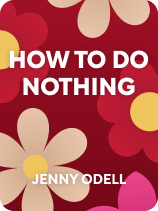

This article is an excerpt from the Shortform book guide to "How to Do Nothing" by Jenny Odell. Shortform has the world's best summaries and analyses of books you should be reading.
Like this article? Sign up for a free trial here.
Are you feeling burned out? Do you sometimes feel like retreating from the world, either temporarily or permanently?
In her book How to Do Nothing, Jenny Odell discusses different ways people try to resist capitalism, particularly the attention economy mindset of placing a monetary value on time and attention. She identifies the methods she believes are flawed and then shares what she thinks is a better way.
Read more to learn about the wrong and right ways to resist capitalism and take back control of your life.
Wrong Ways to Resist Capitalism
Odell critiques two conventional methods people use to resist capitalism’s attention economy: running away from society and doing a temporary “detox.”
1) Running Away From Society
The first form of resistance Odell critiques is leaving society entirely—going “off the grid” in some kind of isolated location or commune. This common fantasy of running away is impractical and self-defeating, argues Odell. Trying to live outside of and separate from our capitalist system is nearly impossible, as it requires total self-sufficiency.
Furthermore, running away from society won’t necessarily get rid of the attention economy mindset of viewing time and attention in terms of monetary value—you can still bring these deep-seated beliefs with you and apply them to your new community.
Lastly, Odell argues that any benefit of running away isn’t worth having to sever all connections with the people, environment, and history of your local community.
(Shortform note: Early Mormon history shows why it’s so difficult to escape capitalism. Under founder Joseph Smith, Mormons lived communally, rejecting private property in favor of social ownership. But over time, this system frayed and eventually collapsed due to infighting and outside persecution—people with wealth objected to the idea of giving it up to be shared with an influx of poor and destitute converts, and there were constant disagreements over how to distribute the communal wealth and property. In addition, non-Mormons often responded violently to these communes, viewing them as political and economic competitors. Eventually, Mormons gave up their communal system and reintegrated with America’s capitalist economy.)
2) Doing a Temporary Detox
The second common understanding of doing nothing is as a temporary detox, or a break from the attention economy, explains Odell. This often takes the form of retreats where you “unplug” or getaways to remote locations without the internet or other common luxuries. Odell argues that the problem with this approach is that it fails to challenge the overall mindset behind the attention economy—viewing time and attention in terms of value and productivity. While retreats might help with stress or burnout in the moment, they don’t change the long-term habits that make people stressed and burned out in the first place.
(Shortform note: Many of the temporary detoxes Odell discusses are themselves participating in the attention economy. This is because they’re a part of the wellness industry: a blanket term referring to beauty products, fitness services, retreats, and other products marketed as physically and mentally healthy. The wellness industry is worth billions or even trillions of dollars (depending on how you calculate it) and has grown massively in the past few years. Because it’s so vast, companies and products in the wellness industry have to compete for the attention of consumers—offering a reprieve from the attention economy while perpetuating it.)
The Right Way to Resist Capitalism
Odell believes that, to resist capitalism and the attention economy, you must do nothing. Doing nothing refers to two major mindset shifts:
- Refusing to engage with the attention economy
- Devoting time to connecting with the world around you
Essentially, doing nothing refers, not to inaction, but rather to devoting time and attention to things you care about that are hard for capitalism and the attention economy to monetize. Odell argues that doing nothing is an effective method of resistance because it actively refutes the mindset of the attention economy, instead of just trying to get away from the circumstances it creates. It also helps address both main consequences of the attention economy: reduced context and social atomization.
To illustrate how “doing nothing” can be a form of resistance, Odell references “Old Survivor,” the last old-growth coastal redwood tree in the Oakland, California area. In the 19th century, the timber industry—a capitalist institution—was cutting down all of the old, massive historic redwood trees in the area for lumber. However, Old Survivor was too small, inaccessible, and gnarled to be worth cutting down, so it was ignored and therefore lived on. In a sense, it resisted simply by doing nothing, and it lived on while all the trees that were “useful” to capitalist society died.
(Shortform note: Just as Old Survivor lived on because it wasn’t “useful,” oppressed peoples throughout history have also resisted by refusing to be productive. In situations where large, organized rebellion proves difficult, oppressed people have commonly resorted to subtler, more personal forms of resistance. This can include sabotage, lies, petty theft, and foot-dragging or refusing to work productively. Odell isn’t talking about living under oppression, but the fact that it’s a tactic used under those conditions suggests just how potent a form of resistance it can be.)
| Quiet Quitting and Doing Nothing While “doing nothing” might seem like it refers to how you use and think about your free time, some people apply a similar mindset during their working hours. In particular, the phenomenon of quiet quitting, or no longer going above and beyond at work, has gained traction in the past few years. Quiet quitting applies the tenets of doing nothing to work hours—quiet quitters reclaim their time and attention by no longer putting in extra work, and quiet quitting encourages people to connect with the world around them by defining themselves in ways separate from their careers. Reactions to this concept have been varied, with some viewing it as a consequence of a younger, less motivated generation while others argue it derives from a lack of economic opportunity. Regardless, quiet quitting shows that for some, doing nothing goes beyond free time and into the workday. |
1) Resisting in the Right Way Adds Context and Depth
Doing nothing gives you a new appreciation for context and depth in your life, according to Odell. Under the attention economy mindset, activities that involve context and depth are “non-productive” because they lack monetary value. But by doing nothing, you’ll stop thinking of context and depth in this way and instead will appreciate how they can connect you to the world. This can apply on a personal level, with you finding more meaning in life through deeper engagement with the things you care about. It can also apply on a broader social level, with people taking the time to refine and contextualize the ideals of their social cause instead of relying on general outrage and discontent.
For example, imagine you’re visiting a beautiful natural landscape. Under the attention economy, you might be tempted to take pictures, post them on social media, and then move on—using your time efficiently to get attention. But if you do nothing instead and just sit and watch, you can gain a far more profound appreciation of the natural beauty: You’ll notice details you otherwise would have missed and see how different parts of the landscape, like animals, plants, and natural features, interact. “Doing nothing” therefore gives you a deeper understanding of the scene and contextualizes it within a broader ecosystem.
(Shortform note: In some cases, “adding” context and depth back in isn’t as simple as it sounds. Sometimes, they’re lost forever. For an example of how this occurs, we can look to modern agriculture and food production. Modern-day techniques maximizing productivity and efficiency have led to a major loss in biodiversity, as many farmers have stuck to only a few high-yield species of crops or livestock while allowing many others to go extinct. It’s also caused the loss of local food cultures and knowledge, as traditional recipes and farming techniques are abandoned in favor of efficiency. This makes connecting with our physical and cultural environment even more important, as it allows us to preserve context and depth before it’s too late.)
2) Resisting in the Right Way Prevents Social Atomization
Odell argues that doing nothing also helps prevent atomization. Once you escape the attention economy mindset, you’ll stop viewing others in terms of monetary value and will instead start viewing them as members of your community. With that perspective, you can connect with the world around you by forming genuine social bonds. This not only helps address personal loneliness and emptiness but also helps people band together to organize around social issues.
(Shortform note: Contrary to Odell, some scholars argue that the changing nature of leisure is one of the main culprits of social atomization—if this is true, “doing nothing” and avoiding the urge to be productive may not prevent atomization. In Bowling Alone, Robert D. Putnam argues that community in America has declined in part because of individualized leisure. Technological advancements mean that instead of using leisure time to connect with others and participate in group activities, more Americans stay home and use their television or computer. Therefore, preventing social atomization might require more than changing how you think about work and productivity—it might also require changing how you think about leisure.)

———End of Preview———
Like what you just read? Read the rest of the world's best book summary and analysis of Jenny Odell's "How to Do Nothing" at Shortform.
Here's what you'll find in our full How to Do Nothing summary:
- Why we always feel the need to be doing something
- Why you should devote time to non-productive activities
- How to engage with the world in a deeper, more satisfying way






